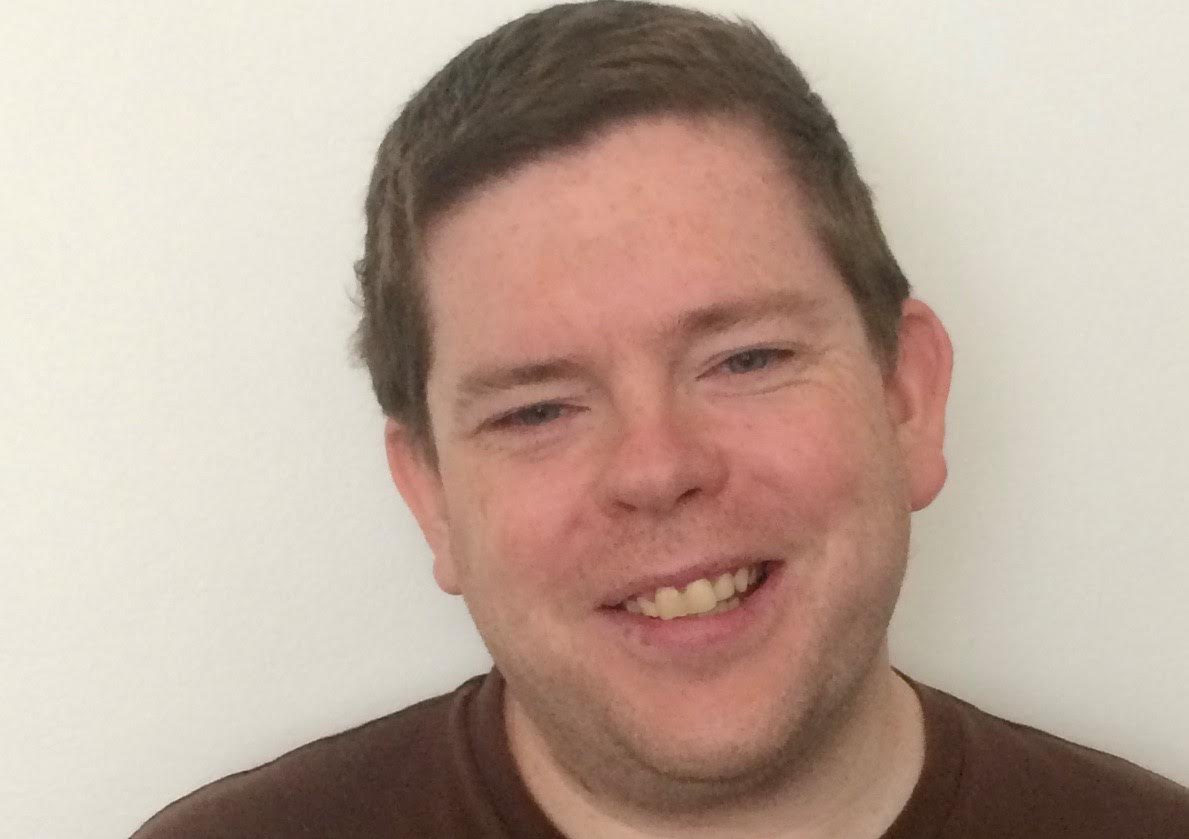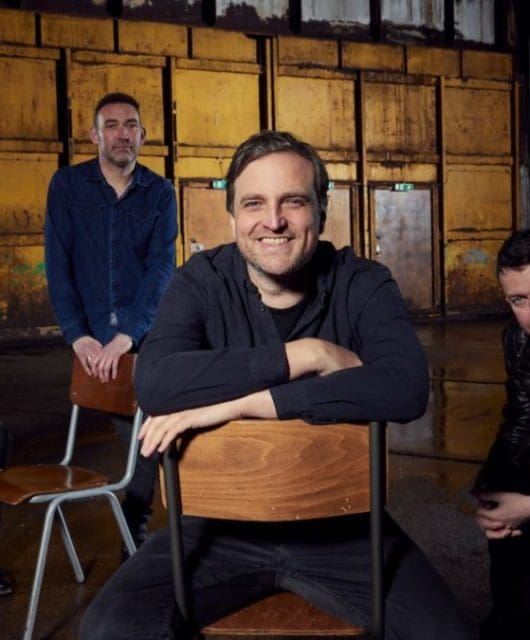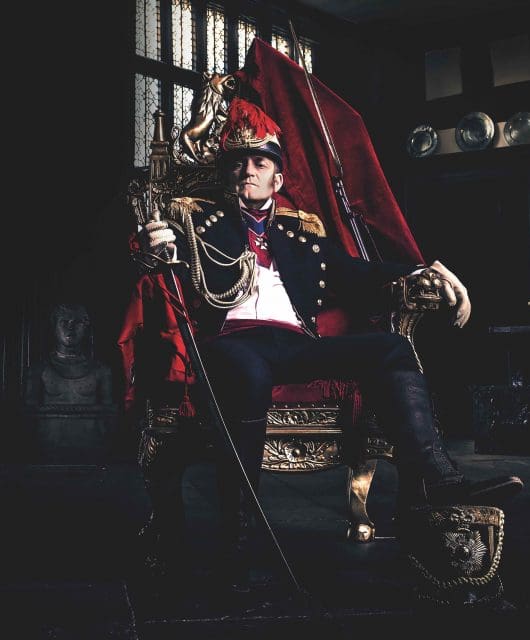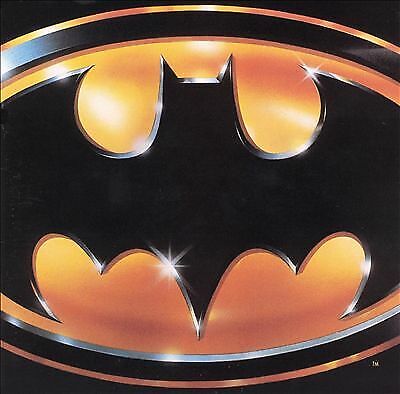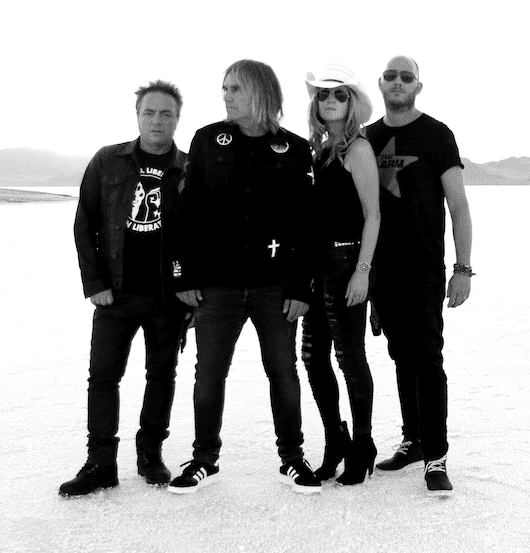Erasure Interview: Turn On The Bright Lights
By John Earls | July 9, 2021
It’s nearly four decades since Erasure’s debut single Who Needs Love Like That, but Andy Bell and Vince Clarke sound as youthful as ever on their latest studio album, the Neon. In this Erasure interview from 2020, Andy and Vince give Classic Pop a masterclass on how to stay relevant – without boring your friends along the way…
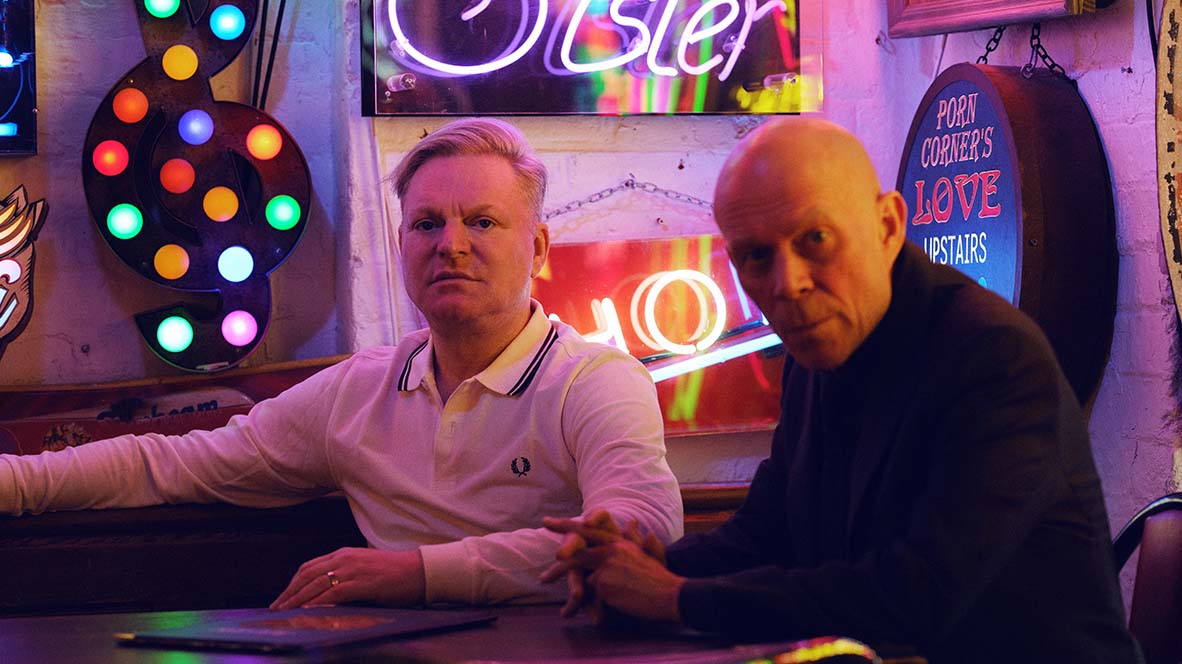
Andy Bell is having problems with his iPad camera. He’s only two minutes late for our Erasure interview Zoom call, but is full of apologies – before the screen suddenly rotates. “You obviously didn’t buy yourself that tripod, then,” notes Vince Clarke affectionately.
Vince’s Zoom background is everything you’d hope from a synthesiser overlord who’s kept up with technology for 40 years: he’s sat at the perfect eyeline with three keyboards lined up on the wall behind him. While Andy continues to spin in and out of shot as he adjusts his iPad, Vince heckles him: “You need to do something here. You’re making this interview look like a Top Of The Pops performance.”
The wisecrack seems to do the trick. Andy is suddenly in view and static, revealing a pristine kitchen work surface, and an Erasure singer smiling in a grey T-shirt and neat thin-framed glasses.
“I’m not a technophobe,” he insists. “But these video calls do make me a bit scared as the only window to the outside world.”
Vince is in lockdown with his wife Tracy and their 14-year-old son Oscar in New York, while Andy is alone in London. Stephen, Andy’s husband of seven years, was unable to get a flight from the couple’s other home in Miami to join the singer.
“I haven’t gone insane yet, or no more than I already was,” Andy quips, trying to put a brave face on their separation. “I can’t wait until the restrictions are dropped, obviously. We do FaceTime sometimes, but we don’t really do video calls. I’m not good with talking! I much prefer texting.”
Vince and Andy’s different technological abilities have helped keep the demarcations constant in Erasure for the 35 years since they arrived fully-formed with the galloping headrush of Who Needs Love Like That. It took the public an album to catch up – having thrived instantly in Depeche Mode and Yazoo, Vince belatedly reacquainted himself with Britain’s tiny venues to tour overlooked debut album Wonderland.
Erasure interview: Cottage industry
Ever since Sometimes became Erasure’s first hit in 1986, the pair have been a constantly firing cottage industry, self-contained in creating dozens of bangers. Their methods are as you’d expect, Andy the empathic lyricist for Vince’s fizzing music, and they hardly ever stray into each other’s territory.
“The synth tech club isn’t for me,” smiles Andy. “The most techy thing I can do is rewire a plug! I’m quite scared of electronics, so it’s a real achievement whenever I buy a lightbulb. I know what sounds I want for a song, but couldn’t attribute them to whichever synth it is that makes them. Synth music got into my blood at the right age and I’ve always been a huge fan of it. But talking about synths? No. Being able to speak about the Moog XX, all of that is right over my head.”
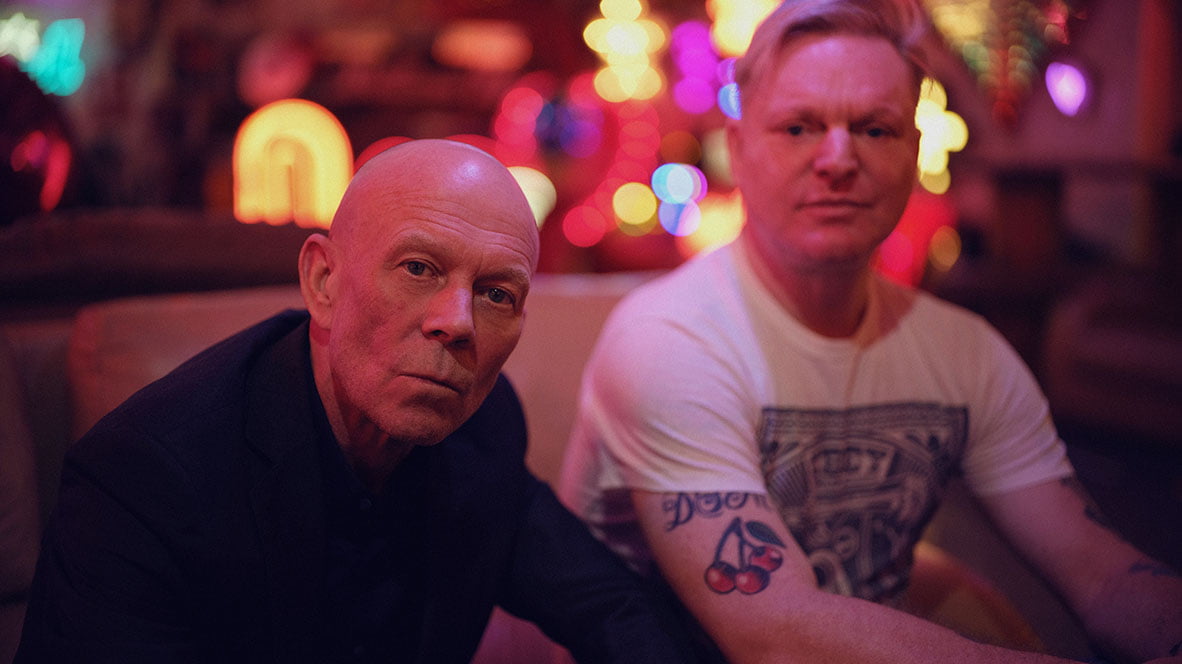
Conversely, Vince steers well clear of writing lyrics. “I never say to Andy, ‘This song sounds like this, so I think it should be about that,’” he explains. “The last time I did that was on Hideaway.”
A fan favourite on second album The Circus, Hideaway was a rare excursion into social commentary for Erasure, with its tale of a young man coming to terms with his sexuality. Andy initially looks startled at Vince’s mention of the old ballad. “Hideaway?” he exclaims. “It wasn’t that long ago, was it?” “Yeah!” smiles Vince. “I said, ‘Let’s write our version of Smalltown Boy’. So we did.”
Two albums ago, Erasure co-wrote 2014’s The Violet Flame with Sugababes/Kelis producer Richard X. It’s the only time Andy and Vince sought outside songwriting help. Most bands of their vintage have at least experimented with the modern methods of working with teams of songwriters.
“Getting outsiders in just isn’t us,” shrugs Andy. “I was reticent to buy Blondie’s last album Pollinator, as I’d seen it was written with so many other people. I thought, ‘There’s no way it’s going to be them.’ I liked some of the songs, I liked that they’d experimented, but it wasn’t Blondie. And it wouldn’t be us if we tried it.”
Erasure interview: Living In America
Andy’s solo albums Electric Blue and Non-Stop were mostly co-written with producers Manhattan Clique and Pascal Gabriel, but also saw the singer dabble with songwriting teams. “I realised how much of a factory conveyor belt that way of working is,” he admits. “Loads of stars go in and out, and the writers pick the one they like. If you’re fortunate, you’re the singer who ends up with the good song that day!”
The process is anathema to Vince, who notes: “I find it odd that there’s teams of people who make a record now. If I was in one of those teams, I’d be really frustrated, because I’d be going, ‘You what? My idea is better!’ It’s the same with comedy. Now I live in America, I watch shows like Saturday Night Live which has a writing committee, not one or two genius comic writers who wrote the British sitcoms I loved. Maybe I’m wrong and it’s fun in those teams, but it’s a very alien idea.”
Despite their insistence on doing things their own way, the pair are conscious not to get stuck in a routine – which Andy confesses has nearly happened along the way. “When you’ve done as many albums as we have, it’s easy to become complacent,” he says. “That happens – it’s natural. But, on this new record, we’ve got out of any complacency. Vince and I travel on different frequencies, but we’ve hit form at the same time with this album.”
It’s the kind of comment that, as Andy himself admits, “Is the kind of thing I’d normally say anyway about a new record”, but he and Vince deserve to be enthusiastic about The Neon. As the name implies, it’s a bright and shiny record, a celebration of pop music itself and Erasure’s ability to have stayed strong while chart music changes around them.
“We’ve stopped worrying,” is Andy’s simple summary. “We’ve got to a point where we’re not chasing anything. We’ve only made this album because we really want to. Nobody was asking us to make an Erasure record like this. I wanted to recreate the same feeling I had as a teenager, discovering OMD and Japan at 16. It’s not about worrying about your age, this record.”
Enjoying this Erasure interview? Check out our feature on the making of their classic album The Circus
Read more: Top 20 Vince Clarke remixes
Erasure’s previous album World Be Gone was beautiful, but it was also unusually introspective. Vince admits The Neon began partly as a reaction to that record.
“I’m not really influenced by other people’s opinions much,” he laughs. “That said, I had a couple of tweets before we started making this record from fans saying how the last album was… not down, exactly, but it wasn’t particularly forward-looking. So they were saying, ‘How about doing a record that’s very up?’ I thought, ‘Yeah, that’s a good idea,’ because we hadn’t really done that for a while. It’s not like we set out to make a dance record, but we did want something more…” Vince pauses, gazes towards Andy’s Zoom image and laughs wryly. “I could use all the clichéd words about this record, that it’s ‘positive’ and ‘forward-thinking’. But what this album reminds me of most is our very early records. And that was definitely in the back of my mind as something to try.”
Erasure interview: Sounding fresh
Andy sounds a note of caution about recreating early Erasure. “When I first heard Vince’s music for this record, it had so many elements reminding me of new wave and 80s music,” he explains. “But what’s so good about it is there’s also so much original nuance that makes the songs sound fresh. I think it could appeal to someone young now, rather than be nostalgic, and that’s important.”
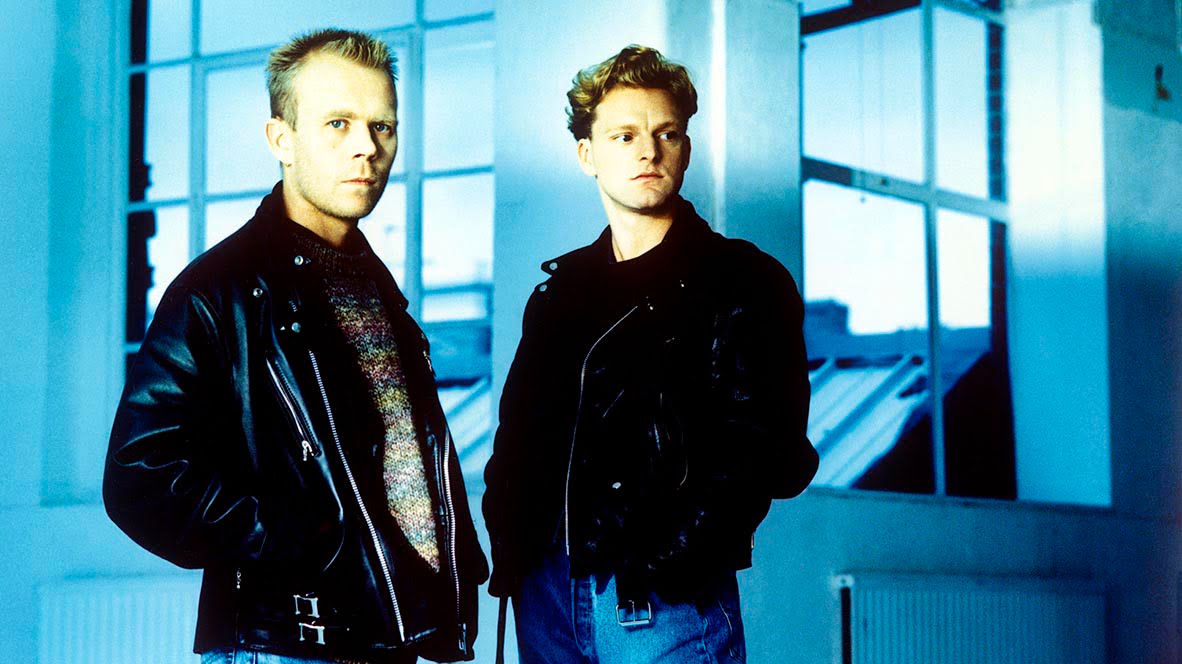
The Neon is much more escapist than its predecessor, which was Erasure’s most openly political album. It had been time to set out their thoughts on the world around them, but it wasn’t something they were especially comfortable in establishing.
“People give their opinions when nobody has asked them the question,” sighs Vince. “People go on Twitter to say ‘I think this!’ and the next day they have to apologise for it. I look at it and think, ‘What was going on in your head that, firstly, you thought anyone would be interested and, secondly, that your view wouldn’t cause some kind of controversy?’ I like to keep my opinions about politics and football to the pub.”
Andy is equally cautious, having left Twitter a couple of years ago when he realised he hated its constant mood of outrage.
“I didn’t really like Twitter,” he admits. “The grief you get on social media platforms outweighs the desire to have followers. I like putting my opinion out there – but if I’m drunk and tweeting, nobody can be held responsible for my comments apart from me! The next day, you go, ‘Oh my God, is that what I said?’ It’s just easier not to be on there at all, and I feel much less weight on me now I’m not.
“Vince is good on Twitter, because he sticks to being a comedian on it. I’m too opinionated, and I don’t want to fall victim to the thought police that holds you to account for something you said 20 years ago.”
The disdain for social media helped spark the positivity in the new songs, as Andy reasons: “There are loads of modern artists I love, but there’s a certain strain of pop where it feels like the ultimate achievement is to have your music get on an advert or sell a product.
“We’re old-fashioned in the sense that it’s just me and Vince making this music, but that means it’s got the spirit of making music in your bedroom when you’re a kid. Yes, Vince has got thousands of synthesisers, but we could easily have done this record on just one. I really hate influencer culture, because it seems like a dead end, but it becomes ironic when those people want to use your songs anyway.”
Key to The Neon is Nerves Of Steel, a love song for Andy’s husband which simultaneously encapsulates Erasure’s us-against-the-world ethos.
“It celebrates my standing with Vince and my new partner,” says Andy, before quickly adding: “I say ‘new’ – we’ve been together nearly 10 years! Nerves Of Steel reminds me of Wrecking Ball by Miley Cyrus, though maybe that’s just because ‘steel’ brings to mind a ball bearing.
“It’s about the feeling you’re on the threshold of something in which you could easily fail, while feeling so exhilarated because you’ve got no clue what’s coming next. Musically, that’s how that song felt when I first heard it – I had no idea where the chorus was going to take me. We’d already written eight or nine strong songs by then, so we could really go to town on this one.”
Asked how Stephen feels to be the subject of such a triumphant love song, Andy bursts out laughing. “Oh, he loves Nerves Of Steel, but his sister and her friend came to Atlanta when we were finishing the album. When that song came on, Stephen looked over and his sister was sticking her fingers down her throat at her friend, because she thought it was so sick-making having to hear that about her brother!”
Erasure interview: Boys’ toys club
It’s that honesty from someone outside the music industry that helps inform Erasure’s attitude while making new music. Perhaps unsurprisingly, Vince is happiest while in his studio at home in New York, where he’s lived for eight years.
“Creating a new song is the best thing we do,” he smiles. “I love making sounds with synthesisers, things I can show off to my friends who are in the ‘boys’ toys club’– ‘Hey, listen to what this can do!’ But getting a song out of nothing? That’s still magic. You go, ‘Where the hell did that come from?’, every time. Writing a song is the most satisfying feeling, other than sex and drugs, obviously.”
Andy laughs, before sounding a serious note: “You have to be careful with friends and your partner when you write a new song, because you can get really boring,” he says. “When you’ve got a great new song, you get really enthusiastic and go, ‘You’ve got to come over and listen to this!’ You soon realise, ‘Oh God, how many times am I going to put my poor friend through this?’ It’s not like you go round to their house in return to look at the spreadsheets they’ve done at the office.
“Musicians are quite boring, really – their friends need a lot of patience, because we do foist our work on them a lot.” Vince has been smiling broadly at Andy’s concerns, adding: “My wife is totally uninterested in anything I do, apart from cooking dinner. Quite right, too.” (On the Clarke family menu the night of our interview: rainbow trout.)
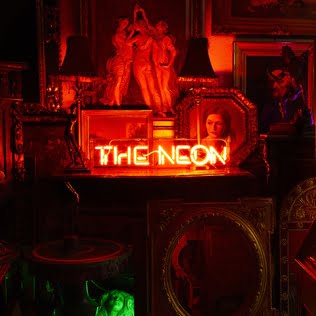
Andy’s husband’s publishing work in Atlanta meant the singer recorded his vocals in the city, a rare move away from Vince’s home studio for recent Erasure albums.
The duo talk delightedly of their experiences there, Vince leaning in conspiratorially to camera to excitedly reveal: “There were people in this proper studio milling about making us cups of tea. I’d forgotten what that was like! Back in the day, we recorded everywhere, and it was nice to be in a new environment again. Atlanta is a foodie town, which helped.”
Andy jokes: “I felt proud to be working in the same city where Elton John lives! It’s a city in the middle of the countryside, so it felt leafy and relaxing even though we were working.”
The feeling of discovery is explicit in The Neon’s lead single, ultra-pop thriller Hey Now (Think I Got A Feeling), which describes being a stranger in town. “The album really took shape once Andy started doing proper vocals,” Vince recalls. “That’s when our songs become songs.”
Read more: Alison Moyet interview
Read more: Depeche Mode’s cover art
Andy adds: “For this record, we wrote the backing vocals in advance, which we don’t usually do. It means the backing vocals become a key hook in the song, rather than being tucked behind it. If you listen to Sweet Dreams or Love Is A Stranger, it’s something Eurythmics were great at. Really, Hey Now… is one big backing vocal.”
Erasure interview: Finding a new audience
Having made a record which lives up to the early Erasure albums which inspired it, the duo are hopeful it’ll find a new audience. Their love of what great pop can do remains undimmed, furthered rather than hindered by having made pop music together for so long. “I still feel like a kid when I hear a great song for the first time,” enthuses Vince. Andy nods in agreement, insisting: “You remain at the age that you first discovered pop music. It never leaves you.”
Vince continues: “Until her dying day, my mum dressed in a youthful way. She was very conscious of her weight until the end. We all carry around our notions of cool with us, no matter how old we are. All that stuff, that buggers you up in some ways, you carry it around with you. No matter what I do, it’s not cool to my 14-year-old son. But in my mind, I’m the one who’s cool. He’s the uncool one, because he doesn’t realise how cool I am!” Andy concludes: “As you get older, you adjust upwards how old you can still be cool: ‘70? That’s not so bad…’”
Alongside their youthful attitude, Andy believes that he grew up at the perfect time to be a pop star, having been born in Peterborough in 1964. “Any art movement only has a 100-year period,” he states. “Pop music has probably had 60 years now and, to me, it’s almost over. The kind of music Vince and I created, it’s the equivalent of the grand masters.
“My parents’ records from the 50s were the beginnings of pop and, in that context, 80s and 90s music was the height of how it was done. I can’t get an angle on how pop and the charts operate now. You have to know how the systems work to be in it, but all the chart talk of how many streams count as a physical copy sold is an unfathomable minefield to me.”
Would Erasure have succeeded if they were starting now?
“The odds have become larger,” Andy responds. “Anything is possible, but it feels more frustrating and that it’d be like trying to win the Lottery from one ticket.”
With their unimpeachable catalogue, surely Erasure would have hit the jackpot at some point. They might be different in how they present themselves on stage, but in their own ways Andy and Vince were both born to be pop stars. And they’re not that different, anyway.
“We seem quite different, but we’re very similar in how we view the world,” Andy points out. “What I’ve really learned from Vince is how to avoid the celebrity lifestyle. I’ve nearly lost it to all that a few times, but I’ve had Vince there to pull me back.”
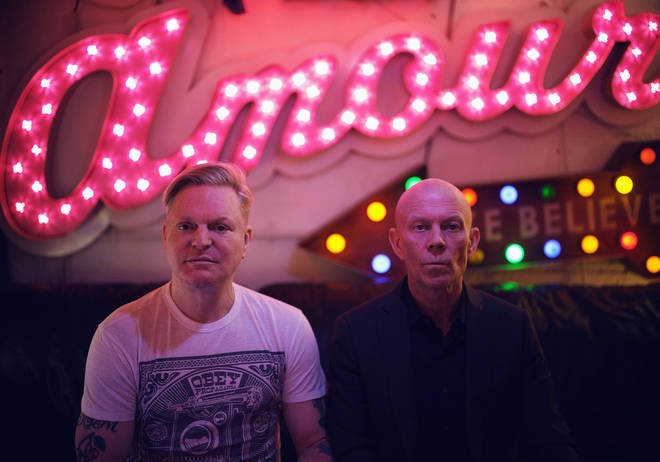
As for Vince? “Andy is the diplomat who makes me temper my opinions,” he admits. “Andy is such a fair man. He sees the good in everybody and realises there’s another story going on to the one someone is shouting at you. Thanks to Andy, I can sit back and listen, even when in my head I’m thinking, ‘Well, that’s wrong.’ I don’t necessarily have to say it anymore!”
It’s a love and respect that should see Erasure carry on indefinitely, rightly adjusting their age you can still be cool as they go.
“When we’re in our eighties, we’ll still be Erasure,” smiles Andy. “By then, Vince will be able to program me.” Vince chips in: “Oh, I’ve planned that already, don’t you worry.” Andy: “I just need to get a USC slot inputted into my chest first.” Vince laughs and deadpans: “It’s USB.” Andy looks into the camera in mock despair. “See? I told you I was no good with that talk!”
One half of an all-time great synth-pop duo is rubbish with the synth part. Long may Erasure continue being unbeatable at the pop side.
Did you enjoy this Erasure interview? Then check out our feature on Vince Clarke’s cover art
Check out Erasure’s website here
Photos by Richard Sharp and Richard Haughton
